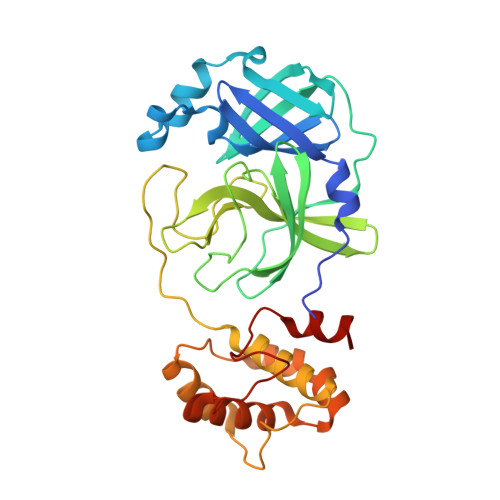Structure-Guided Design of Potent Inhibitors of SARS-CoV-2 3CL Protease: Structural, Biochemical, and Cell-Based Studies.
Dampalla, C.S., Rathnayake, A.D., Perera, K.D., Jesri, A.M., Nguyen, H.N., Miller, M.J., Thurman, H.A., Zheng, J., Kashipathy, M.M., Battaile, K.P., Lovell, S., Perlman, S., Kim, Y., Groutas, W.C., Chang, K.O.(2021) J Med Chem 64: 17846-17865
- PubMed: 34865476
- DOI: https://doi.org/10.1021/acs.jmedchem.1c01037
- Primary Citation of Related Structures:
7LZT, 7LZU, 7LZV, 7LZW, 7LZX, 7LZY, 7LZZ, 7M00, 7M01, 7M02, 7M03, 7M04 - PubMed Abstract:
The COVID-19 pandemic is having a major impact on public health worldwide, and there is an urgent need for the creation of an armamentarium of effective therapeutics, including vaccines, biologics, and small-molecule therapeutics, to combat SARS-CoV-2 and emerging variants. Inspection of the virus life cycle reveals multiple viral- and host-based choke points that can be exploited to combat the virus. SARS-CoV-2 3C-like protease (3CLpro), an enzyme essential for viral replication, is an attractive target for therapeutic intervention, and the design of inhibitors of the protease may lead to the emergence of effective SARS-CoV-2-specific antivirals. We describe herein the results of our studies related to the application of X-ray crystallography, the Thorpe-Ingold effect, deuteration, and stereochemistry in the design of highly potent and nontoxic inhibitors of SARS-CoV-2 3CLpro.
Organizational Affiliation:
Department of Chemistry, Wichita State University, Wichita, Kansas 67260, United States.
















